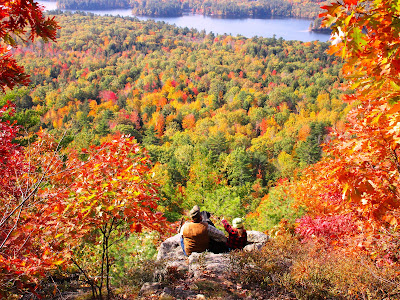We all have a favorite spot for recreation during Maine’s summer and for many people hiking Pismire Bluff Trail in the Raymond Community Forest is a must.
 |
| Hiking the Pismire Bluff Trail in the Raymond Community Forest is a year-round scenic experience that many continue to enjoy year after year. PHOTO BY JON EVANS |
Prior to 2016, these 360 acres belonged to the Hancock Land Company which harvested timber for Hancock Lumber. Today, the Raymond Community Forest boasts several miles of multi-purpose trails and beautiful views.
This project had “a lot of different partners... with a lot of community support” says Jon Evans, Stewardship Manager for the Loon Echo Land Trust.
Evans said that funding for the purchase was fueled by a state program called Land for Maine’s Future (LMF), individual donors, and local foundations.
The land trust immediately began planning for trails since the property was already being accessed by people viewing the mountain vistas from the bluff.
“People have been scrambling up there for 100 years,” Evans said.
Loon Echo Land Trust hired the Appalachian Mountain Club to build a trail that had a goal of getting people to that bluff. The idea was the overall area impacted on the mountain would decrease if there was one route. A safe trail would also reduce erosion and safeguard impact to rare grasses and flowers.
According to Evans, the land trust is aware of several sensitive plant communities on the bluff, including the rare Fern-leaved False Foxglove, a late-summer flower that grows along the trails.
There is also a Maple Ash Basswood natural community and woodland. Summer Grapes are unique to the area and grow along the Grape Expectations Trail.
Another preliminary project for the Pismire Bluff Trail was the multiuse trail system by the parking area.
A local bike enthusiast and now a “super volunteer,” Dave Dowler, approached the Loon Echo Land Trust with an idea to create paths for bikes.
Today’s Spiller Homestead Loop is the result of years of hard work and about 400 volunteer hours coordinated by Dowler and while this particular type of trail was not an original Loon Echo Land Trust idea, it soon became an exciting project.
“You want to harness that volunteer spirit,” Evans said. "On this trail, there’s no roots or thresholds because bikers have higher standards, but pedestrians also benefit. To build a trail of that standards with volunteers is really incredible.”
In its first year, the infrared trail counters tracked 5,000 visitors at Raymond Community Forest.
That’s no surprise to Evans, who says ““It is one of my very favorite places… We are incredibly proud of how it turned out.”
At the Raymond Community Forest, there is a balance between ecological integrity and recreational use. The property is great for hiking, biking, snowshoeing, and cross-country skiing.
Pismire Bluff is similar to Bald Mountain with no large investment in time.
Evans says it’s also a “great and satisfying hike for folks that are older or have mobility limitations”.
The Maple Ash community is particularly beautiful in the fall. Grasses grow in the understory and in September, when the canopy is turning yellow above, it creates a very unique and picturesque forest scene for hikers to enjoy.
The trails counter is still tracking about the same number of visitors but there was a radical increase during COVID. The rate at which people were visiting far exceeded the land trust’s ability to maintain the trails.
With 40 miles of trails across the land trust’s several properties, volunteers have played a critical role in trail management. Loon Echo Land Trust has a trail adoption program where people sign up to take responsibility of trails by cutting brush, reporting tree falls, and overall looking after the trails.
The major goal is to keep trails passable and have “eyes, ears, and boots on the ground,” says Evans.
Interested volunteers can also participate in trail workdays which are scheduled frequently throughout the summer and occur at different properties. Loon Echo Land Trust provides necessary training and tools.
Another benefit to volunteering is that it allows people to get out on the land a better understand conservation.
“There’s a large portion of people that use conserved land but don’t know what it means,” Evans said.
Maine is predominantly privately owned, so land trusts are critical in providing access for recreation. It’s good to get people out there so they can learn about what a land trust does.
“We want folks to be satisfied with their experiences and understand why it matters,” says Evans. “They are not making new land.”
This community forest will be extremely unique in the future because properties are constantly being developed in the lakes area. The property acts as a buffer between natural communities and development, making it ecologically valuable as well.
“We do this for the future and future generations, and all walks of life,” Evans said.
Learn more about Loon Echo Land Trust at www.lelt.org. <


No comments:
Post a Comment